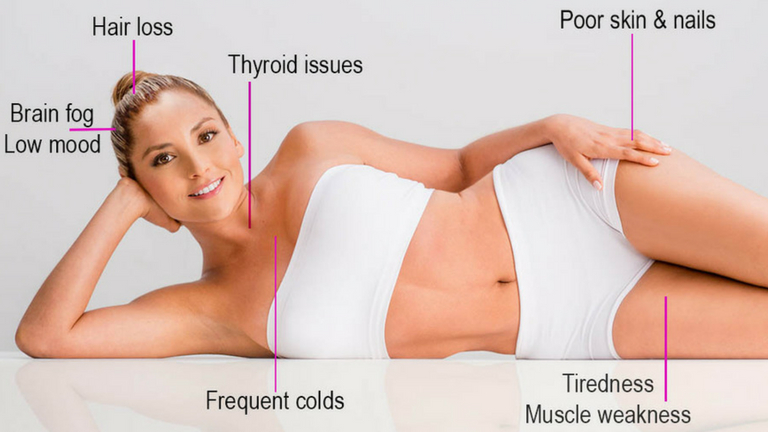
Selenium is an essential trace (needed in small amounts) mineral important for various body functions. Selenium is a vital trace mineral that plays a role in thyroid hormone metabolism and immune function and protects against oxidative damage to cells.
The body needs selenium to form and activate certain enzymes, and some of these enzymes are necessary to prevent damage from free radicals (which cause aging). The antioxidant enzyme glutathione peroxidase is needed to form, protecting DNA from free radical damage.
Selenium deficiency can result in hair loss, nails that break easily, and fingernails that turn white. It also can cause fatigue, mood problems, and swollen joints.
Selenium deficiency can be caused by inadequate intake or absorption of selenium or the inability to convert enough dietary selenium into a form the body can use. Selenium deficiency may occur with other nutrient deficiencies, such as vitamin B12 or folic acid, which may impair the conversion of selenium.
Inadequate selenium intake is rare in the United States but may occur if people eat very little meat or seafood. Deficiency is more common in areas where the soil is depleted, or local agricultural practices include raising foods without selenium supplements or fertilizers. In these cases, selenium deficiency occurs alongside other nutrient deficiencies such as iodine and vitamin A.
Symptoms of Selenium Deficiency
The signs and symptoms of selenium deficiency include:
-
Anemia
A lack of red blood cells can cause symptoms such as fatigue, pale skin, and shortness of breath.
-
Low levels of white blood cells (neutropenia)
A selenium deficiency may result in fewer white blood cells called neutrophils, which help fight infection by killing bacteria and viruses. Low neutrophils are known as neutropenia; symptoms include frequent infections and fevers.
-
Muscle weakness or fatigue.
Selenium helps convert the amino acid tyrosine into thyroid hormone T4 (thyroxine), which is necessary for normal muscle function and energy production.
Suppose your selenium level is low or your conversion process is inefficient due to an intestinal disorder such as Crohn’s disease or celiac disease. In that case, you may experience muscle weakness or fatigue from low thyroid hormone levels.
-
Skin Lesions on the hands and feet (photosensitive granulomas)
These are raised bumps on the skin that form when the sun shines on the skin for a long time. They can be red or brown and may have scales or crusts.
-
Impaired immunity
Selenium deficiency can impair your immune system, making you more likely to get sick from common infections like the flu or colds.
-
Infertility
Selenium deficiency can also affect fertility in both women and men by causing hormonal imbalances that result in irregular menstrual cycles or infertility. In women, this happens when the ovaries don’t produce enough estrogen; in men, it’s caused by low testosterone levels.
-
Poor thyroid function
A healthy thyroid gland produces two essential hormones for normal growth and development: T4 (thyroxine) and T3 (triiodothyronine). Selenium plays a role in converting T4 into the active form of the hormone known as T3. Without enough selenium, the thyroid won’t be able to produce enough T3, which can lead to hypothyroidism — an underactive thyroid gland — and cause symptoms such as fatigue and weight gain.
Other symptoms of selenium deficiency include:
- Atrophy of the testes and ovaries
- White patches on fingernails or toenails
- Numbness in hands and feet (peripheral neuropathy)
- Hair loss on the scalp (alopecia)
- Poor concentrations and memory






